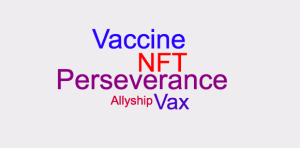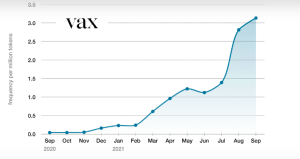 Just as in 2020, one subject drove us in record numbers to Google and online dictionaries and dominated our lives this past year – that pesky pandemic.
Just as in 2020, one subject drove us in record numbers to Google and online dictionaries and dominated our lives this past year – that pesky pandemic.
This time, as we got used to words like quarantine, lockdown, pandemic, COVID-19 itself and the ever-present epidemiologist, we actually had time to spend checking out words related to other events in the world.
First, the pandemic-related words that earned spots on Word of the Year lists:
Vaccine: Merriam-Webster
Vaccine comes from the Latin word for “cow” (vacca). The term initially referred to inoculation using doses of cowpox, which turned out to protect humans against smallpox, explains Merriam-Webster. Interest in the word has been high since the start of the pandemic. Comparing 2021 to 2019, lookups for the word increased 1048%. Other top lookups were insurrection, cicada (big due to their emergence in 2021 after 17 years), cisgender, Perseverence and woke.
Vax: Oxford Languages
“No word better captures the atmosphere of the past year than vax,” says Oxford Languages, publisher of the Oxford English Dictionary. A relatively rare word in its collection until 2021, vax occurred more than 72 times as often in September 2021 as a year earlier. It also spawned a range of derivatives, from vax sites and vax cards to getting vaxxed and being fully vaxxed or double-vaxxed.
“The numerals”: Global Language Monitor
No mention of COVID-19 or its variants is complete without a full run-down of the relevant stats, like infections, new cases or records, says Global Language Monitor (link no longer active). COVID-19 has about 4 billion citations on Google, accompanied by tens of billions of supporting numbers. COVID-19 itself also made the list, along with wokeness, variant and the (gender-neutral) pronouns.
A variety of other terms snuck in amid the focus on COVID-19:
Allyship: Dictionary.com
Dictionary.com chose allyship as a word intertwined with the polarization of 2020 and so many of the things we’ve experienced in 2021. Allyship is “the status of being an advocate for the inclusion of a marginalized group of which the advocate is not a member.”
Insurrection: American Dialect Society
Some 300 people took part in the vote to choose the ADS word of the year. “Insurrection – a term for a violent attempt to take control of the government – is the one that many felt best encapsulates the threat to democracy experienced [Jan. 6, 2021],” said Ben Zimmer, chair of the ADS New Words Committee.
NFT: Collins English Dictionary
The convergence of money and the internet led to Collins announcing NFT as word of the year. An abbreviation that stands for non-fungible token, it’s a chunk of digital data that records ownership of a digital asset such as artwork or a collectible. However, the pandemic “still looms large over us all,” Collins says. Related words that made the short list included double-vaxxed, hybrid working and pingdemic – the large-scale notification of members of the public by a contact-tracing app.
Perseverance: Cambridge Dictionary
For 2021, people looked up perseverance more than 243,000 times. The choice cleverly recognizes both NASA’s Perseverance Rover and our continued efforts during the pandemic “to do or achieve something, even when this is difficult or takes a long time.”
Other words in the news in 2021:
“Centres for National Resilience”: Plain English Foundation
This Australian foundation creates a list of the worst words and phrases each year, to highlight the importance of clear public language. “Australians like to pride ourselves on calling a spade a spade,” says Dr. Neil James, the foundation’s executive director. He called out Australian authorities for using Centres for National Resilience instead of quarantine centres. Others on the worst list include national vaccination allocation horizons (vaccine rollout targets), negative encounter (shark attack) and edged weapon (knife).
Wait, what?: Lake Superior State University
The university doesn’t post a word of the year, but shares a list of 10 words or phrases to be avoided as “overworked, redundant, oxymoronic, clichéd, illogical and nonsensical.” Nominators most hated “Wait, what?” – a phrase intended to express astonishment, misunderstanding or disbelief. Lots of jargon also made the list, like at the end of the day, circle back and deep dive.
Did any of these words capture your own mood in 2021? Which are you most fed up with?
Image: WorditOut.com.
Related reading:
COVID-19 dominates Words of the Year in 2020
2018 was a more innocent time when there was no pandemic
100+ buzzwords and jargon bugging us in 2021

